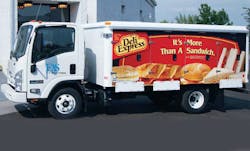As fleets look for alternative fuels and/or power solutions to reduce fuel usage and cut emissions, one Minnesotabased fleet found a more
cost-effective option that has almost doubled its mpg. Deli Express, a fleet of 240 vehicles and part of the larger Eden Prairie, MN-based E.A. Sween Co., is having success with the low-cab-forward NPR Eco-Max truck from Isuzu Commercial Truck of America.
“[We’re] truly excited from a company perspective because [outfitting the entire fleet could] potentially save up to $2 million a year [in operating costs],” says Gregg Hodgdon, head of fleet operations for Deli Express, a manufacturer of Deli Express sandwiches, which are sold in more than in 26 states and distributed by the private delivery fleet.
The company is operating two of the Eco-Max trucks now with four more on order, Hodgdon says. But he has been so happy with their performance to date that Deli Express is accelerating its replacement cycle slightly, which now sits at about six years, to incorporate more of the vehicles into its fleet.
The switch to the trucks has resulted in a nearly 50% improvement in fuel economy over the company’s older Isuzu NRR models, which average 8.2 mpg. Hodgdon says the two NPR Eco-Max trucks are getting “about 15 mpg.” The 12,000-lb.-GVWR NPR Eco- Max is powered by Isuzu’s 4JJ1-TC 3L turbocharged diesel engine with automatic transmission, offering 150 hp. and 282 lbs.-ft. of torque. It is built with a high-pressure common-rail fuel injection system and features an intercooled, variable- geometry turbocharger. According to Isuzu, oil drains are extended to 10,000 mi. and the engine has a B10 durability rating of 310,000 mi., meaning that 90% of the engines produced will reach that mileage before requiring an overhaul.
STAYING TRADITIONAL
Deli Express expects the NPR Eco- Max trucks to emit 4.2 tons less carbon dioxide each year.
“These results are proof that it is possible to improve a fleet’s carbon footprint through weight reduction and efficient technologies while still utilizing a traditional fuel source,” Hodgdon says.
He is not the only one excited about the vehicles; the drivers are very happy as well, he reports. The low-to-the-ground design allows drivers to stand on the ground to unload at one of the 20 average stops a day they make, rather than climbing in and out of a van body all day.
Hodgdon was attracted to the trucks for many reasons. “Fuel economy...a fairly low cost of ownership... and Isuzu backs its trucks better than anyone,” he says. The decision to remain with a traditional fuel was made in conjunction with Automotive Resources International, Deli Express’ fleet management partner.
“We realized that it was indeed possible to make a positive, sustainable change with traditional fuels,” says Hodgdon, “but it would require an innovative truck design that could significantly improve fuel economy without compromising the power, reliability and convenience that Deli Express drivers demand.”
“We are thrilled—but not surprised— that the NPR Eco-Max is already performing so well for our partners at Deli Express,” says Shaun C. Skinner, executive vice president and general manager of Isuzu.
But slicing costs from the fuel budget requires more than just a fuel-efficient truck, especially when your delivery vehicle requires constant refrigeration. Deli Express trucks operate in a wide variety of temperature ranges, so a unit was needed that could provide both cooling and if necessary, warming.
Thermo King had an answer. The company created the prototype V-520 RT Spectrum direct drive unit. The V-520 dual-temp unit has an innovative heating system that enables productivity gains by allowing specialized thawing applications to occur on the truck rather than in a warehouse, Deli Express says.
The unit, which sits on a truck’s roof, also has a hot-gas heating element that allows Deli Express to pump warm air into the box when the outside ambient temperature reaches a point where items in the truck would otherwise freeze. Proving that a fleet can stay with a traditional fuel and still achieve the savings for which its looking.
